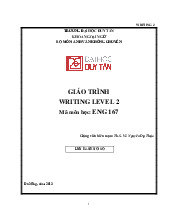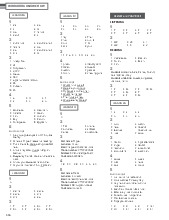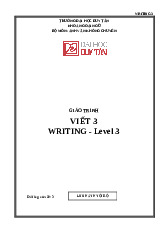





Preview text:
COMPOUND SENTENCE
A compound sentence is two or more independent
clauses joined together, like two adults joined
together in marriage. Each clause is of importance
and could stand alone.There are three ways to join
independent clauses to form a compound sentence I.
Compound Sentences with Coordinators (coordinating conjunction) II. Compound Sentences with Conjunctive Adverbs
III. Compound Sentences with Semicolons
I. Compound Sentences with Coordinators
(coordinating conjunction)
Independent Clause + Coordinator + Independent Clause
(comma) (FAN BOYS: for, and, nor, but, or, yet, so) EX:
- Should we start class now, or wait for everyone to get here?
- He hasn’t eaten anything today, nor has he slept.
- I didn’t want to go out, yet I went anyway.
- Sam needs to go to school, but he’s too tired to wake up.
- I love dogs, for they are really cute and loyal.
- They came there early, and they got the best seats.
- My money is run out of now, so I have to stop buy trifles. N.B:
but-> the two clauses express equal, contrasting ideas
yet -> the second clause is a surprising or unexpected
contrast to the first clause II. Compound Sentences
with Conjunctive Adverbs
Independent clause; Conjunctive Adverb, Independent clause semicolon comma
=> Just like the FAN BOYS coordinators, conjunctive adverbs express the
relationship of the second clause to the first clause. The following chart shows the
coordinators and conjunctive adverbs that express similar relationships.
Coordinating Conjunctions Conjunctive Adverbs Meaning and
besides, furthermore, moreover, additional ideas also but, yet however, nevertheless, still opposite idea nonetheless or otherwise choice; “or else” so accordingly, hence, result consequently, therefore, thus Ex:
- The text was so difficult; however, John finished it quickly.
- My sister and I often argue with each other about all sorts of
things; therefore, our relationship is not really good.
- They have to take the final exam this time; otherwise, they won't be able to graduate.
- Emma is beautiful; moreover, she is rich. NB:
There are four kinds of conjunctive adverbs depending on their positions:
-Introducer c.a.: Therefore, I decided to leave the party for home.
-Coordinator c.a.: I haven’t been able to talk to anyone for 3
hours; therefore, I decided to leave the party for the home.
-Inserter c.a: I, therefore, decided to leave the party for home.
-Tag c.a.: I decided to leave the party for home, therefore.
III. Compound Sentences with Semicolons
A compound sentence can also be formed with a semicolon alone.
Independent Clause1; + Independent Clause2 semicolon Ex:
- My mother is cooking I am washing clothes. ;
- The school ends at 5 pm my friends and I go home together ; .
- I didn’t sleep last night I feel tired today ; .
: This kind of sentence is possible only when the two independent
clauses are closely related in meaning. If they aren’t closely related, they
should be written as two simple sentences, each ending with a period. Ex:
- Anna wants to lose weight she drinks so much water ; .
- My brother is student I ride a bike to school. . THANK YOU FOR YOUR WATCHING AND LISTENING



